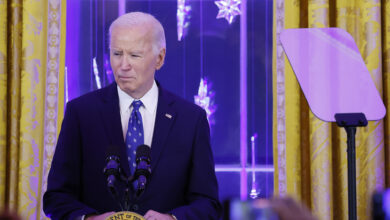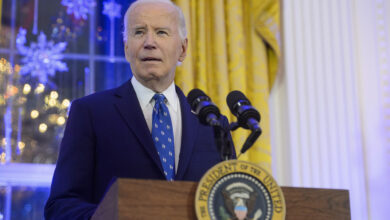The public is standing up to a conspiracy of censorship by elites

A global offensive has been launched to strangle digital speech. The censors aren’t Chinese Communists or Iranian theocrats but members in good standing of the progressive elite class in democratic countries.
To save democracy, the elites claim, they must reduce to a minimum the public’s access to information and communication. Because ordinary people are easily duped by the truth-telling guardians, superior to this weakness, must control and detoxify the flow of digital content.
I won’t pretend to be shocked by this surge of oppression, which merely expands the scope and intensity of a process that has been accelerating for some time.
Thanks to Twitter Files, we know the Biden-Harris administration erected an elaborate digital censorship apparatus that silenced disfavored individuals like Donald Trump and took down millions of offending posts.
Thanks to Mark Zuckerberg’s recent letter to Congress, we know that, starting in 2021, the Biden White House pressured him successfully “to censor certain Covid-19 content, including humor and satire” on Facebook.
To begin with, however, the trampling on the First Amendment was perpetrated surreptitiously, as if with a bad conscience, betraying at least the pretense of a sense of shame.
That has changed. The assault on speech has come out of the closet. To a remarkable degree, the censors have grown brazen and righteous: Their mission, they tell us, is to prevent a populist dictatorship, and to do this they have no choice but to apply dictatorial methods.
The itch to throttle digital platforms is universal among the ruling classes of the world. The European Union, for example, has wielded hate-speech laws and privacy concerns to leap far ahead of the US in the race to subdue the Web.
In Britain, social-media influencers are being prosecuted for fomenting riots — and have been told by the authorities that they should “know they are not safe and there is nowhere to hide.”
But no one embodies the elite’s revaluation of democratic values more egregiously than an unelected Brazilian judge, Alexandre de Moraes. His rise to celebrity status as supreme censor of that country deserves attention for a number of reasons.
Accountable to none
First, he has been granted autocratic power over Brazil’s information sphere, not by the president or by law but by another unelected tribunal. He seems accountable to nobody.
Second, his explicit objective is to save democracy from itself, by controlling electoral outcomes. The populist revolt that gave us Brexit and Trump, and Jair Bolsonaro in Brazil, must be crushed under the weight of arrests, prosecutions, and exorbitant fines.
In the world according to de Moraes, elections are valid only when the progressive left wins: hHis maneuvers are a sideways stumbling towards one-party rule.
Third, the judge clearly regards social media as nothing more than a vector of populist disinformation and manipulation, to be brought under his benevolent control.
To that end, de Moraes has relentlessly hounded Elon Musk, owner of X (formerly Twitter), the most unbuttoned social media forum. The running quarrel between de Moraes and Musk — two
attention-hungry men — has been loud and very public. The conclusion was foreordained.
On Aug. 30, de Moraes banned X in Brazil, citing “anti-democratic discourse” as the reason. He imposed a daily $8,900 fine on anyone who accessed the platform by way of Virtual Private Networks (VPNs); this was later grudgingly walked back. The attorney representing X was threatened with imprisonment. So was Musk himself.
At one stroke, 20 million Brazilian tweeters were silenced and disconnected. There can be no doubt that de Moraes considers this to be a good thing.
Other countries that have blocked X include China, Russia, Iran and Burma. All are ruled by dictatorial regimes afraid of the aspirations of their own people. Judge de Moraes wins points for originality: He’s the first to pose as a fearless champion of democracy while booting the voters out of the information sphere and locking the door behind him.
He will not be the last.
A final point concerns the US reaction to this incident — by which I mean, of course, our utter nonreaction.
Though an American company had been targeted for arbitrary persecution and expulsion in Brazil, and basic rights seemed to be under attack there, the Biden administration said or did nothing. The same holds true for the Harris campaign. The silence, we can be sure, connoted satisfaction, not indifference.
Biden and Harris share a deep and sincere loathing of Musk. His elimination and the reconquest of control over X has been a priority among the progressive elites who dominate the Democratic Party. In part, this is due to partisan rancor but, as with Trump, it’s also a strongly personal feeling –— both men are traitors to their class.
REUTERS
Playing the hero
To Democratic grandees, de Moraes is less a tyrant or a bully than a heroic role model of governance in a revaluated democracy. Some Democrats openly applauded the judge’s takedown of X in Brazil.
Others, like former Secretary of Labor Robert Reich, urged “regulators around the world” to arrest Musk “if he doesn’t stop disseminating lies and hate on X.”
In the world according to Reich, opposition to progressive ideas counts as a criminal offense.
Progressive fantasies aside, will we come to see governments of the left, in democratic nations, prosecuting tech lords like Musk for the content of their platforms?
We know the answer to this question. On Aug. 24, Pavel Durov, founder and CEO of Telegram, was arrested by French authorities at Le Bourget Airport in Paris — punishment for the material disseminated by the nearly one billion users of the site.
Telegram is an encrypted and relatively secure digital messaging service. It has been used as a safe haven not only by political dissidents in places like Hong Kong, but also by criminals and other unsavory actors. The charges against Durov include “complicity in managing an online platform to enable illegal transactions.”
Durov is worth $15 billion and holds citizenship in four countries. He’s hardly a defenseless victim. But he notes, correctly, that “if a country is unhappy with an internet service, the established procedure is to start a legal action against the service itself.”
Why the drama of the arrest — the desperate grab for attention and the personalizing of guilt — by the government of Emmanuel Macron?
To get at the heart of the matter, we need to scale up this question: Why have the progressive elites in ostensibly democratic countries gone to war against digital speech?
Media scholar Andrey Mir argues that we are witnessing a reassertion of elite authority after two decades of massive political turbulence caused by the advent of the Web.
The Durov affair, Mir writes, represents “the completion of the institutions’ adaptation to digital challenges. Institutional control over the public sphere and people’s lives was shattered by the initial spread of the internet; now the institutions are regaining control.”
“The state is tightening its grip,” Mir concludes. “The Restoration has begun.”
It’s a bad bet to contradict Mir, who probably knows more about media than anyone alive today. But I arrive at a very different interpretation of the facts.
Mir assumes digital censorship to be a demonstration of elite strength. I believe it’s quite the opposite: a panicked reaction to a precipitous loss of power and prestige.
Emerging out of the existential parenthesis of the pandemic, the public is once again in a surly temper, eager to rattle the status quo and perfectly willing to vote for populists if that’s what it takes.
The electoral triumphs of Meloni in Italy, Milei in Argentina and Wilders in the Netherlands, the continued popularity of Victor Orban in Hungary and Nayib Bukele in El Salvador, the advance of pariah parties like Marine Le Pen’s National Rally in France and the Alternative fur Deutschland in Germany, all give evidence to the harrowing political landscape the elites must traverse.
Meanwhile, here at home, Trump keeps coming back to life like a zombie in the movies.
Elite control issues
Conversely, governments under elite control are in deep trouble. The ruling coalition in Germany is hanging by a thread. The new Labour government in Britain has seen its popularity decline sharply to 29%percent.
The American censor in chief, Joe Biden, was forced to withdraw from the presidential race.
Even in Brazil, an immense crowd took to the streets to protest the banning of X and de Moraes’ encroachment on free speech.
The Durov arrest is simply an indicator of the failure of the Macron presidency. Between the rise of the hard left and that of the hard right, France has become ungovernable.
Under the stress of multiple contradictions, the constitutional framework of the French republic is visibly cracking apart. Macron’s incompetence has compounded these disasters.
Riding the earthquake, Macron knows that somehow, in an unfathomable way, the Internet is the cause of many of his troubles — and if the theatrical humiliation of Durov accomplished nothing, it surely afforded the French president a rare burst of gratification.
The word “Restoration” brings to mind the Stuarts returning to London with their heavy-metal hairdos and fluffy dogs.
If we must deal in historical parallels, I’d prefer Metternich and the Congress of Vienna. But neither attempt at reaction succeeded in any sense.
Counterrevolutions are doomed because they carry the poisoned word “revolution” in their midst: the past can be rejected, never reversed.
Our current elite class may be hyper-credentialed, but it’s not particularly sophisticated. It wants something like a global time machine to transport us back to the 20th century — before the revolution.
Is that possible? The revaluation of democracy sought by the elites could only be achieved in a facsimile or “Truman Show” version of the last century.
Politics, including elections, would then be reduced to a performative sham. Democracy would come to mean one-party government.
This depressing scenario is possible, I suppose, but only if the voters allow it to happen. The elites are helpless without validation from below — that’s why they embarked on their repressive crusade in the first place. They hope to stack the odds in their favor.
It’s true that our elections have turned weird beyond words, but they are still meaningful. There are real choices to be made, important questions to be answered.
The future, I’m saying, is in our hands.




